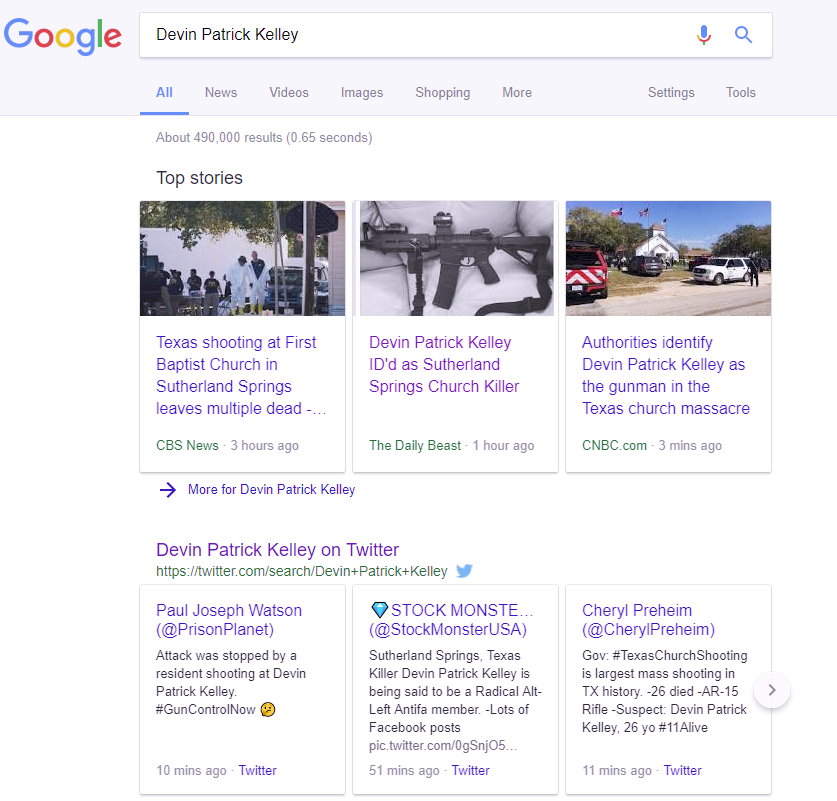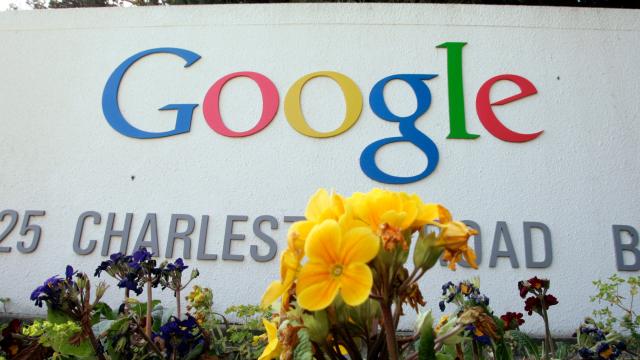As authorities named Devin Patrick Kelley as the shooter in a horrifying massacre in Sutherland Springs, Texas which resulted in at least 26 deaths, Google once again served up misinformation and posts from conspiracy theorists at the top of search results for his name.
Photo: AP
On Sunday evening, Googling “Devin Patrick Kelley” delivered results from Paul Joseph Watson, the far-right personality behind InfoWars-affiliated conspiracy website Prison Planet.
It also pulled up unfounded allegations Kelley was a member of antifa, an umbrella term for loosely organised groups of anti-fascist activists across the country which have become an exaggerated boogeyman in the conservative media.
The posts arrived in the form of Google’s “Popular on Twitter” module, which appears directly below “Top stories” at the top of search results.

Image: Screengrab via Google
As noted by NYC Media Lab executive director Justin Hendrix on Twitter, other dubious information pulled into the Twitter module included that Kelley was a member of a “Pro Bernie Sanders Group,” a “#MUSLIM Convert,” “a radical Alt-left, with potential ties to ANTIFA,” or named “Samir Al-Hajeeda.”
Google’s ‘Popular On Twitter’ news feature is a misinformation gutter. Search for Devin Patrick Kelley just now surfaced these four items. pic.twitter.com/06rcPOgx5b
— Justin Hendrix (@justinhendrix) November 6, 2017
@Google fails to serve its customers when it recommends alt-right conspiracy theorists as legit info sources in the aftermath of a tragedy.
— Jonathon Morgan (@jonathonmorgan) November 6, 2017
Google directs users searching for “Devin Patrick Kelley” to an InfoWars editor and a person warning about the InfoWars editor. pic.twitter.com/MgGDRMX66j
— Scott Bixby (@scottbix) November 6, 2017
According to the Daily Beast, the real Kelley was a former U.S. Air Force member who Defence Department records show was sentenced to a “bad-conduct discharge, 12 months confinement, and two reductions in rank to basic airman” after he was court-martialed in 2012. Screenshots of his Facebook obtained by the Beast included a photo of an semi-automatic scoped rifle with the caption “She’s a bad bitch,” but not anti-fascist symbols. Per CBS, officials were unclear as to Kelley’s motive as of Sunday evening, but said he “doesn’t appear to be linked to any organised terrorist groups.”
The spread of unverified or deliberately falsified information from gutter-level sources in the wake of crises, aided by venues like Google and Twitter, has become a real problem with real consequences. In the hours after the shooting, Texas Rep. Vicente Gonzalez fell for a reoccurring far-right social media meme claiming comedian Sam Hyde was responsible for the shootings and repeated that information during a live CNN broadcast.
Rep. Vicente González just repeated the well-known 4chan hoax that the shooter’s name was Sam Hyde. That name is circulated EVERY shooting pic.twitter.com/Aa6juBf8oM
— Brandon Wall (@Walldo) November 5, 2017
The Twitter module is designed to give users a view of the social media conversation surrounding a trending event, but as this incident makes clear, deliberately inflammatory posts that play to readers’ prejudices are often the ones scooped up.
After another massacre in Las Vegas in October, Google’s top stories module linked to 4chan’s far-right board /pol/, which identified the wrong perpetrator and claimed he was motivated by his opposition to President Donald Trump. Afterwards, Google subsidiary YouTube’s search results promoted unfounded theories the killings were a false flag attack.
Google, Twitter, and Facebook have all regularly shifted the blame to algorithms when this happens, but the issue is that said companies write the algorithms, making them responsible for what they churn out. As CNN’s Jonathon Morgan noted, those algorithms are often designed to “show attention-grabbing, influential content to exactly the people most likely to be manipulated by it.”
Of course, platforms are only part of the picture. As with other stories like the murder of Democratic National Committee staffer Seth Rich, uncritical promotion of conspiracy theories by prominent media and political figures plays an additional role in elevating and keeping the misinformation alive long after it originally spread online. But at the end of the day, a handful of tech companies that dominate how Americans access information online don’t seem to have been particularly active in addressing the problem.
We’ve reached out to Google, and will update this post if we hear back.
